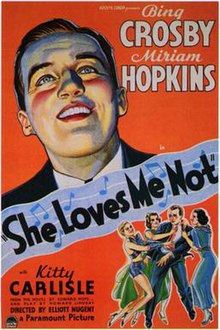Harry Revel was a British-born American composer, mostly of musical theatre, working with various lyricists, notably Mack Gordon. He is also seen as a pioneer of "space age pop".

The Big Broadcast of 1936 is a 1935 American comedy film directed by Norman Taurog, and is the second in the series of Big Broadcast movies. The musical comedy starred Jack Oakie, Bing Crosby, George Burns, Gracie Allen, Ethel Merman, The Nicholas Brothers, Lyda Roberti, Wendy Barrie, Mary Boland, Charlie Ruggles, Akim Tamiroff, Amos 'n' Andy, Bill "Bojangles" Robinson, and Argentinian tango singer Carlos Gardel.

Murder at the Vanities is a 1934 American pre-Code musical film with music by Victor Young. It was released by Paramount Pictures and directed by Mitchell Leisen. The film stars Victor McLaglen, Carl Brisson, Jack Oakie, Kitty Carlisle, Gertrude Michael, Toby Wing and Jessie Ralph. Future stars Lucille Ball and Ann Sheridan have small roles as chorines.

Bing: A Musical Autobiography was Bing Crosby's fourth Decca vinyl LP, recorded and released in 1954.

We're Not Dressing is a 1934 pre-Code screwball musical comedy film directed by Norman Taurog and starring Bing Crosby, Carole Lombard, George Burns, Gracie Allen and Ethel Merman. Based on the 1902 J. M. Barrie play The Admirable Crichton, the film is about a beautiful yacht owner (Lombard) who becomes stranded on an island with her socialite friends, a wacky husband-and-wife research team and a singing sailor (Crosby). The supporting cast features Leon Errol and Ray Milland.
"Love in Bloom" is a popular song with music by Ralph Rainger and lyrics by Leo Robin, published in 1934. It was introduced in the film She Loves Me Not by Bing Crosby and Kitty Carlisle. It remained familiar for many years thereafter as the theme song of Jack Benny, played at the opening of his radio and television programs.

Harry Barris was an American popular singer and songwriter. He was one of the earliest singers to use "scat singing" in recordings. Barris, one of Paul Whiteman's Rhythm Boys, along with Bing Crosby and Al Rinker, scatted on several songs, including "Mississippi Mud," which Barris wrote in 1927.

Star Spangled Rhythm is a 1942 American all-star cast musical film made by Paramount Pictures during World War II as a morale booster. Many of the Hollywood studios produced such films during the war, with the intent of entertaining the troops overseas and civilians back home and to encourage fundraising – as well as to show the studios' patriotism. This film was also the first released by Paramount to be shown for 8 weeks.

Anything Goes is a 1936 American musical film directed by Lewis Milestone and starring Bing Crosby, Ethel Merman, Charles Ruggles and Ida Lupino. It is based on the 1934 stage musical Anything Goes by Guy Bolton and P. G. Wodehouse, which included songs by Cole Porter.
Rhythm on the Range is a 1936 American Western musical film directed by Norman Taurog and starring Bing Crosby, Frances Farmer, and Bob Burns. Based on a story by Mervin J. Houser, the film is about a cowboy who meets a beautiful young woman while returning from a rodeo in the east, and invites her to stay at his California ranch to experience his simple, honest way of life. Rhythm on the Range was Crosby's only Western film and introduced two western songs, "Empty Saddles" by Billy Hill and "I'm an Old Cowhand " by Johnny Mercer, the latter becoming a national hit song for Crosby. The film played a role in familiarizing its audience with the singing cowboy and Western music on a national level.

"I'm an Old Cowhand (From the Rio Grande)" is a comic song written by Johnny Mercer for the Paramount Pictures release Rhythm on the Range and sung by its star, Bing Crosby. The Crosby commercial recording was made on July 17, 1936, with Jimmy Dorsey & his Orchestra for Decca Records. It was a huge hit in 1936, reaching the No. 2 spot in the charts of the day, and it greatly furthered Mercer's career. Crosby recorded the song again in 1954 for his album Bing: A Musical Autobiography.
Members of the Western Writers of America chose it as one of the Top 100 Western songs of all time. It has also been covered by numerous jazz musicians, including Sonny Rollins, Monty Alexander, Joshua Redman, and John Scofield.

Too Much Harmony is a 1933 American black-and-white pre-Code musical film directed by A. Edward Sutherland and starring Bing Crosby, Jack Oakie, Richard "Skeets" Gallagher, Harry Green, and Judith Allen. It was released by Paramount Pictures.
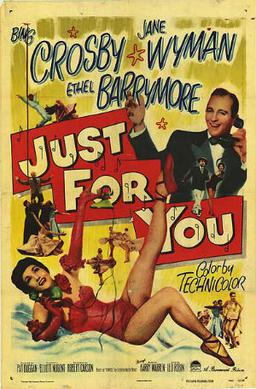
Just for You is a 1952 American musical film starring Bing Crosby and Jane Wyman and the final motion picture to be directed by Elliott Nugent. It was nominated for Best Song at the 1953 Academy Awards. The film was based on the book Famous by Stephen Vincent Benét. Filming took place between October 22 and December 20, 1951. It is said that Judy Garland had originally been sent a script as she was being considered for the female lead, but she apparently decided not to proceed with the project. Location scenes were filmed at Lake Arrowhead, near San Bernardino, California and at Big Bear Lake in the San Bernardino National Forest.

Here Is My Heart is a 1934 American musical comedy film directed by Frank Tuttle and starring Bing Crosby, Kitty Carlisle, and Roland Young. It is based on the play La Grande-duchesse et le garçon d'étage by Alfred Savoir.
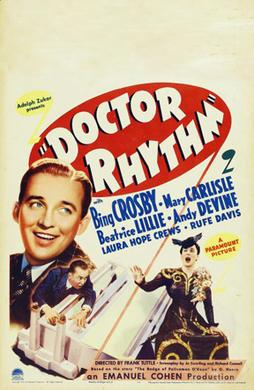
Doctor Rhythm is a 1938 American musical comedy film directed by Frank Tuttle and starring Bing Crosby, Mary Carlisle, Beatrice Lillie, and Andy Devine. Based on the 1907 short story The Badge of Policeman O'Roon by O. Henry, the film is about a doctor who pretends to be a policeman assigned as the bodyguard of a wealthy matron, whose beautiful niece becomes the object of his affections. The film features the songs "On the Sentimental Side" and "My Heart Is Taking Lessons".
This is a list of notable events in music that took place in the year 1934.
College Rhythm is a 1934 American musical comedy film directed by Norman Taurog and starring Jack Oakie, Mary Brian, and Joe Penner.
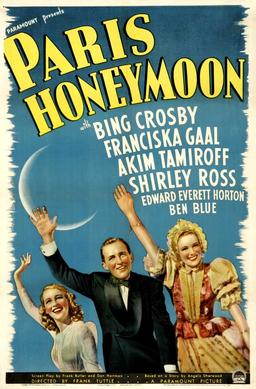
Paris Honeymoon is a 1939 American musical film directed by Frank Tuttle and written by Frank Butler and Don Hartman. The film stars Bing Crosby, Franciska Gaal, Akim Tamiroff, Shirley Ross, Edward Everett Horton and Ben Blue. Filming took place in Hollywood from May 23 to July 1938 and the film was released on January 27, 1939, by Paramount Pictures.
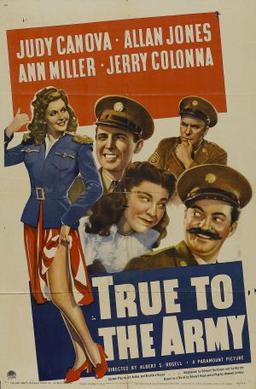
True to the Army is a 1942 American comedy film directed by Albert S. Rogell, written by Art Arthur, Bradford Ropes, Edmund L. Hartmann and Val Burton, and starring Judy Canova, Allan Jones, Ann Miller, Jerry Colonna, Clarence Kolb, Edward Pawley and William Wright. It was released on March 21, 1942, by Paramount Pictures.
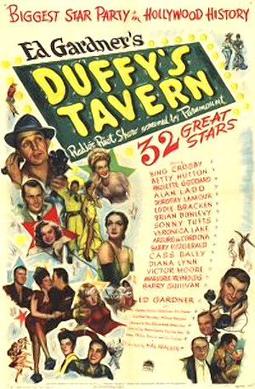
Duffy's Tavern is a 1945 American comedy film directed by Hal Walker and written by Melvin Frank and Norman Panama. The film stars Ed Gardner, Bing Crosby, Betty Hutton, Paulette Goddard, Alan Ladd, Dorothy Lamour, Eddie Bracken and Brian Donlevy. The film was released on September 28, 1945, by Paramount Pictures.
